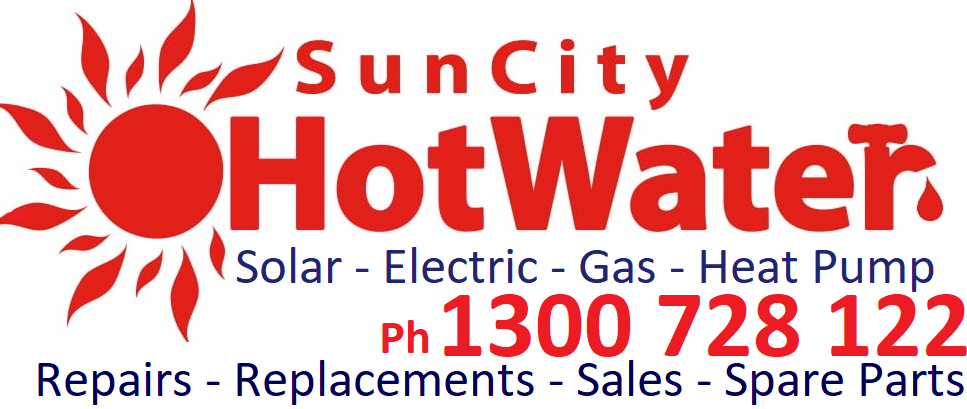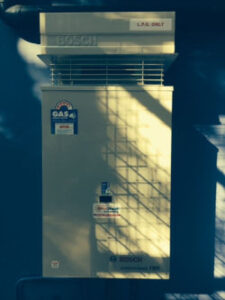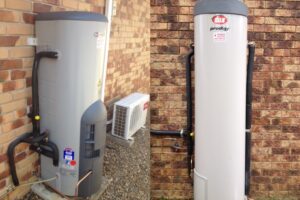When purchasing a new hot water systems there are many factors to take into account. With the many different types of hot water systems available today, the choice can be overwhelming. Knowing that choosing the wrong system could lead to years of huge power bills or constantly running out of hot water, this is not a decision to be taken lightly.
You may have heard different facts about gas and electric systems, but what is the real difference between each type of system? We have put together a buyers guide to hot water systems with information on each type of system including tankless, storage, gas, electric, and solar.
For more information on any of these systems or on which one is right for you, why not ask the experts? Call Sun City Hot Water and Plumbing on 1300 728 122 today for free advice from your local hot water specialists.

Tankless Hot Water Systems
As the name implies, tankless hot water systems do not require a tank. Instead of pre heating the water and storing it for daily use, tankless hot water systems heat the water on demand. This can be a big money saver, especially if you aren’t sure of your water usage or what size tank you will need.
When compared to storage hot water systems, the average tankless hot water system is significantly more expensive upfront. However, because of the on demand design and high energy efficiency of tankless hot water systems, they are less expensive to run. On average, within the first year of use you will make back the difference in upfront costs through the reduced running costs of tankless hot water heaters.
Tankless hot water systems also have a longer expected lifetime than storage hot water systems. You can expect a tankless system to last 20+ years whereas, a storage system will only last 10 – 15 years on average.
An advantage of tankless hot water heaters when compared with storage hot water systems is the unlimited hot water supply. Because the water is heated as needed, there is no waiting period while a new tank of water is being heated.
One drawback of tankless hot water systems is an inconsistent flow rate. Hot water from a tankless hot water system is heated as needed. This means that if multiple outlets are in use, the heated water is divided between each outlet. This results in a reduced flow rate.
The reduced flow rate when multiple outlets are in use means that each tankless system can only sustain a finite number of outlets before the flow rate becomes too low to use. This can be remedied by the use of single point systems on hot water outlets to augment the hot water usage during peak times.
Single point systems are smaller tankless hot water systems that can be connected to one or two outlets. Single point systems are smaller than regular tankless hot water systems which means they can be installed closer to the outlets they are servicing. This reduces heat loss while the hot water travels from the heating system to the outlet. This in turn reduces energy costs. Single point systems provide hot water to the connected outlet(s) independently to the main hot water system.
Without the use of additional single point systems it is important to assess the size of the house and number of hot water outlets that are used simultaneously before you purchase a new system. This includes any dishwashers, washing machines and other hot water reliant appliances. Once you have determined how many units are used simultaneously at peak periods you will be able to calculate the maximum flow rate you require for your tankless hot water system, or if you need multiple systems.
Note: For smaller houses additional hot water heaters may not be required. Consult your local hot water experts for personalised advice.
The Sun City team have been providing quality hot water system services to North brisbane and the Sunshine Coast for over 15 years. Call Sun City Hot Water & Plumbing on 1300 728 122 for all of your hot water system queries.
Gas Hot Water System (Tankless)Tankless gas hot water systems are usually more energy efficient than electric hot water systems. Gas is also a more environmentally friendly option as these types of systems produce less harmful emissions.
Gas powered tankless hot water systems generally have a higher flow rate than electric hot water systems. The higher flow rate makes tankless gas systems a more viable option for larger houses than tankless electric hot water systems.
Tankless gas hot water systems require gas mains connections. If your house does not have existing connections you can use LPG gas, however, it is much more expensive to run this way.Tankless gas hot water systems usually require complex installations due to the high gas outputs. Existing vents in most homes are not sufficient and new vents must be installed. This means that the installation of a gas system can be very expensive compared to electric systems.
Electric Hot Water System (Tankless)
The electric powered tankless hot water systems can be up to 50% cheaper to purchase than their gas counterparts. Additionally, tankless electric hot water systems are much cheaper to install and are more energy efficient than gas systems.
Though gas is a cheaper fuel than electricity, the high energy efficiency of electric systems generally makes up for the difference in cost. This means that on average, gas and electric tankless hot water systems have similar running costs. Tankless electric hot water systems can be up to 60% smaller than gas systems. This means that they can be installed in more convenient places such as the cupboard under the sink. Because electric systems can be installed in closer proximity to the hot water outlets they service, heat loss in the water while travelling from the system to the outlet is reduced. This contributes to the high energy efficiency of electric storage systems.Electric systems also have lower maintenance costs than gas tankless hot water systems. This is because gas systems need to be inspected annually to ensure they are operating correctly and safely.
Storage Hot Water Systems
Storage hot water systems are the most common type of water heaters found in Australian homes. Storage water heaters require a storage tank. The size of the storage tank will depend on the water consumption of your household. Water is heated in the tank and the water temperature is maintained throughout the day.
One advantage of a storage hot water heater when compared to a tankless hot water heater is the unlimited flow rate. Because storage hot water systems heat the whole tank of water at once, you can use multiple outlets without a significant reduction in flow rate.
However, there are also drawbacks to having to preheat the water before use. Because storage systems can’t heat on demand, there is a finite amount of hot water available before a new tank will need to be heated. This is how you end up with a cold shower in the morning when someone else has used up all of the hot water.
The limited supply of hot water can be overcome by calculating how much hot water your household will use during your peak water usage period. If you buy a storage tank large enough to cater for the maximum water usage of your household, running out of hot water should not be an issue.
Another drawback of storage hot water heaters is their lack of energy efficiency. In a storage system, hot water is stored in the tank all day. There is no tank that is insulated well enough to maintain the preset water temperature through insulation alone. This is because heat is lost through the walls of the tank. This means that the system will constantly need to reheat the water during the day to maintain the desired water temperature.
Well-insulated storage tanks can significantly reduce running costs as less heat will escape the tank. There are also other insulation devices available to help reduce the heat loss in the water including hot water heater blankets.
Some storage hot water systems come with an off-peak heating system. This means that the water is heated during off peak periods which can reduce the running costs of the system due to off-peak tariffs.
Gas Hot Water System (Storage)
Gas storage hot water systems are generally more energy efficient than their electric counterparts. Gas systems also have the added benefit of producing lower amounts of greenhouse gas emissions.
Additionally, gas storage hot water systems can be cheaper to run as unlike with electricity, there are no peak tariff issues. This means that hot water can be produced throughout the day at no extra cost as the cost of gas will not change in peak times. Because the water in a gas storage system can be heated all day, the storage tank does not have to be as large as electric storage systems that only heat water overnight.
Installations costs are comparable when it comes to electric and gas storage systems. However, if there is no existing gas supply to the house, installation costs can skyrocket. Alternatively, gas storage hot water systems can be fueled by LPG however, this is a more expensive way to run the system than a direct connection to mains gas.
Gas storage hot water systems have a quicker recovery rate than electric systems. This means that when you run out of hot water, there is less downtime before more hot water is available. This makes gas storage hot water systems more suitable than electric for larger households. And, if there is a power outage, you will not lose your supply of hot water with a gas storage system.
Electric Hot Water System (Storage)
There is little to no difference in the upfront costs of electric and gas hot water systems. Electric storage hot water systems are more energy efficient than gas systems. However, because of the higher electricity rates, electric storage systems are still more expensive to run.
For maximum cost efficiency, some electric storage hot water heaters can be set to only heat water during off peak periods. For these systems, larger storage tanks are required as they will need to store enough water for the entire day until new water is heated the next night.
Electric hot water systems generally take several hours to reheat a tank of water once the hot water has run out, much longer than their gas counterparts.
Solar Hot Water System
Solar hot water systems harness the free energy from the sun to heat water. Considering that on average, heating water accounts for around 25% of a household’s energy usage, a solar hot water system can significantly decrease the size of your electricity bill.
Because there are generally periods with insufficient sunlight to power a solar hot water system, they will usually come equipped with booster units, either gas or electric, to produce hot water at these times. Even though a solar hot water system needs a secondary energy supply, solar still has some of the lowest running costs and greenhouse gas emissions of any hot water system.
However, if the solar system is not optimised for the size of the house, the running costs will be higher. For example, if there are not enough solar panels, the booster unit will need to be used more to produce enough hot water for the household which will lead to an increase in running costs.
Solar hot water systems are the most expensive type of system to install and can cost up to four times as much as a standard storage hot water system. Plus, the efficiency of the system depends somewhat on the climate and the positioning of the solar panels.
Another drawback of a solar hot water system is that it requires a minimum amount of sunlight for the system to be effective. This means that the roof or surface where the panels will be mounted need to be solar panel compatible. So solar hot water systems are not a viable option for everyone.
The labour costs that come with a solar hot water system installation is another large upfront expense to consider when purchasing a solar system. This is because the installation of solar hot water system can take days as opposed to the single day installation of a standard storage system.
The information on each system is based on an average household with a standard hot water system. If you want professional advice on which hot water system is best for your household, call Sun City Hot Water and Plumbing on 1300 728 122 today. We offer free expert advice as well as professional hot water system installation and maintenance services, at competitive prices, Brisbane and Sunshine Coast wide.






